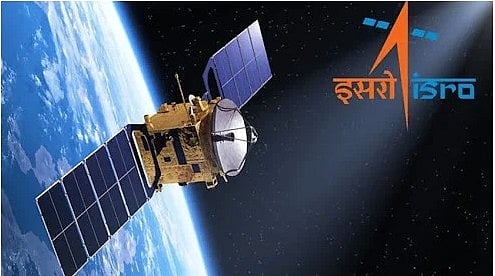
Image for representation only
Credits: ISRO
In 2024, an Indian satellite narrowly avoided a collision with a foreign spacecraft. The incident, while not catastrophic, rattled policymakers in New Delhi and set off a conversation: how does India safeguard its growing fleet of satellites from accidental crashes, cyberattacks, or even hostile manoeuvres in space?
One idea under discussion is straight out of science fiction — “bodyguard satellites.” These would be dedicated spacecraft that hover close to high-value Indian satellites, monitoring their surroundings and stepping in if another object gets dangerously close. If realised, this move would place India among the handful of countries considering active satellite protection systems in orbit.
Bloomberg recently reported that officials are pursuing a Rs 27,000-crore ($3 billion) plan to deploy around 50 surveillance satellites, with the first launch expected next year. The initiative forms a crucial part of India’s broader strategy to safeguard its growing fleet of spacecraft.
The government is also working with private startups to explore advanced technical solutions, including the potential use of LiDAR (Light Detection and Ranging) satellites. These systems could detect threats in orbit more quickly, giving operators on the ground valuable time to instruct satellites to manoeuvre and avoid collisions or hostile activity.
The plan envisions integrating these new orbital assets with ground-based radars and telescopes to create a more comprehensive, multi-layered protective network.
India already has some systems in place to protect satellites. The IS4OM centre in Bengaluru tracks satellites and alerts operators about possible collisions. In 2023, Indian satellites had to perform over ten collision-avoidance manoeuvres. India’s Project NETRA is adding more radars and telescopes to improve this monitoring. Still, India does not yet have continuous, 24/7 surveillance like the US or Europe.
Space security has also become more important because of global events. The Russia-Ukraine war showed how vulnerable satellites can be. For India, the growing partnership between Pakistan and China adds to the urgency.
India’s plans for bodyguard satellites, along with new surveillance satellites, radars, cybersecurity measures, and solar monitoring, form a multi-layered strategy to protect its space assets. India is also participating in international forums to promote responsible behaviour in space and reduce the risk of debris.
